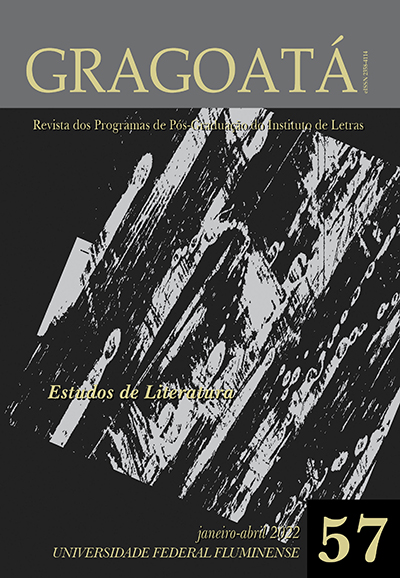A resposta de Fabio Durão à crise da teoria literária em Metodologia de pesquisa em literatura
DOI :
https://doi.org/10.22409/gragoata.v27i57.51299Mots-clés :
Teoria, Metodologia, Ciência, Falseabilidade, Estudos literáriosRésumé
Em seu mais recente livro, Fábio Ackcelrud Durão parte da premissa de que a pesquisa em letras no Brasil é indissociável do aparato institucional e político que a legitima, propondo assim uma investigação crítica das práticas de pesquisa da universidade brasileira. Para o autor, a sobrevivência dos estudos literários à atual crise institucional depende de metodologias de pesquisa e práticas capazes de desacelerar o produtivismo acadêmico, possibilitando um debate mais sólido e de maior impacto entre os pares. Isso seria possível a partir da delimitação de um certo campo de objetividade comum, no qual a interpretação de textos e o close reading sejam privilegiados em detrimento de interpretações normativas. Nesta resenha, discuto os argumentos de Durão, questionando a hipótese de que uma melhor regulação do campo se daria pelo estabelecimento de um objeto comum. A partir de uma comparação entre as metodologias das ciências empíricas e as dos estudos literários, proponho que o problema no Brasil não é tanto a falta de uma compreensão comum de seu objeto (isto é, a literatura), mas mais um uso não-científico da teoria. Defendo, portanto, que os pesquisadores de literatura tenham como horizonte o falseamento das premissas teóricas aceitas pela comunidade, tal como no campo das ciências experimentais, e não simplesmente a aplicação de diferentes teorias com vistas à interpretação textual.
Téléchargements
Téléchargements
Publiée
Numéro
Rubrique
Licence
AUTORIZAÇÃO
Autores que publicam em Gragoatá concordam com os seguintes termos:
Os autores mantêm os direitos e cedem à revista o direito à primeira publicação, simultaneamente submetido a uma licença Creative Commons Atribuição 4.0 Internacional (CC BY 4.0), que permite o compartilhamento por terceiros com a devida menção ao autor e à primeira publicação pela Gragoatá.
Os autores podem entrar em acordos contratuais adicionais e separados para a distribuição não exclusiva da versão publicada da obra (por exemplo, postá-la em um repositório institucional ou publicá-la em um livro), com o reconhecimento de sua publicação inicial na Gragoatá.
A Gragoatá utiliza uma Licença Creative Commons - Atribuição CC BY 4.0 Internacional.











